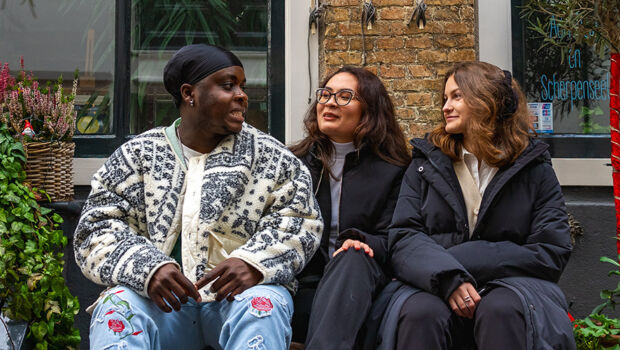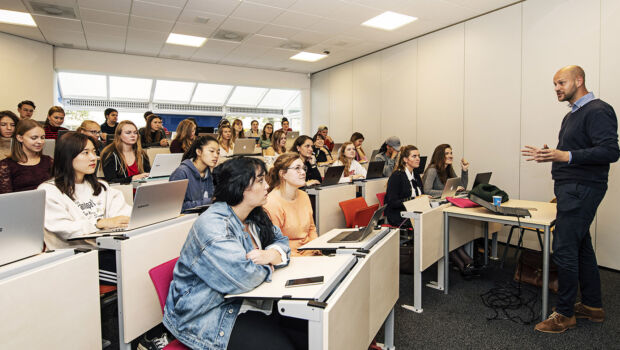There are two types of students: those who know from a young age what they want to study, and those who still have no clue about what they want to do with their lives. If you’re part of the second group, don’t panic—just take a deep breath and keep reading.
Choosing a study programme can feel like one of the most daunting decisions you’ll ever make. With countless options available, and the pressure to pick the "right" one, it's easy to feel overwhelmed. But don't worry—if you’re unsure about what to study, you’re not alone. Many students face the same dilemma. These steps will help you navigate the process and make a choice that feels right for you.
Learn everything you need to know about our study programmes1. Understanding yourself
The first step in choosing a study programme is understanding yourself. Start by making a list of your strengths and weaknesses. What are you good at? What subjects did you enjoy the most in school? Equally important is identifying what you don't enjoy. Knowing what you dislike can be just as revealing as knowing what you love.
If you’re struggling to pinpoint your strengths or interests, try reflecting on your hobbies or activities that make you lose track of time. Ask yourself, "What could I see myself doing every day for the next few years?" Sometimes, the answer lies in the things we do naturally without even thinking about it.
2. Research, research, research
Once you’ve got a clearer sense of your strengths and interests, it’s time to dive into researching different study programmes. Look beyond the course titles and dig into the details. What subjects will you study? What skills will you learn? Will the programme open up career opportunities that excite you?
Visit the university’s website and read the descriptions of the programmes that catch your eye. Write down key terms or skills mentioned in these descriptions and compare them with your list of strengths and interests. This will help you filter out programmes that don’t align with what you’re looking for.
3. Visit an (online) open day
Experiencing the atmosphere of a study programme can be a game-changer in your decision-making process. Attend open days to meet teachers and current students, and get a firsthand feel for the environment. Ask them about their experiences and see if you can envision yourself there. For those looking to study abroad, this might seem challenging, but technology has made it easier than ever. HZ Univeristy of Applied Sciences offer online information sessions or virtual campus tours, and you can even speak with student advisors to get a sense of what to expect. Embracing these resources can help you make a more informed and confident decision.
4. Think about your future
t’s also important to think about where you want to be in the future. While it might feel impossible to predict your career path, having a general idea can guide your decision. Ask yourself questions like:
- What kind of lifestyle do I want to have?
- What fields or industries am I interested in?
- Do I prefer working with people, data, or creative projects?
Your answers can help narrow down your choices. For example, if you’re passionate about environmental issues, a programme in environmental science or sustainability might be a good fit. If you enjoy problem-solving and technology, consider programmes in engineering or computer science.
5. Seek advice, but follow your heart
Talking to others can provide valuable insights, but remember, the final decision is yours. Friends, family, and teachers might offer advice based on their own experiences, but what worked for them might not work for you. It’s essential to listen to your inner voice and consider what will make you happiest in the long run.
If you’re stuck between two programmes, weigh the pros and cons of each. Sometimes, the choice will become clearer as you reflect on what excites you the most. And don’t forget—it’s okay to take a risk. Sometimes following your heart, even when it feels uncertain, leads to the most rewarding experiences.
6. Do not fear making a 'wrong' choice
One of the biggest fears students face is making the "wrong" choice. But remember, no decision is set in stone. If you start a programme and realise it’s not the right fit, you can always change direction. Many students switch majors or even universities after their first year. What’s important is that you’re learning and growing along the way.
Every experience, whether good or bad, teaches you something valuable. So, don’t let the fear of making a mistake hold you back. Instead, view each step as part of your journey towards finding what truly suits you.
7. Trust the process
Finally, remember that choosing a study programme is a process. It’s okay to take your time and explore your options. Attend open days, talk to current students, and explore potential career paths. The more informed you are, the more confident you’ll feel in your decision.
Choosing a study programme is a significant step, but it doesn’t have to be stressful. By understanding yourself, researching thoroughly, and trusting your instincts, you can make a choice that aligns with your goals and passions. Remember, this is your journey—make it a rewarding one.
Next step: applying!







